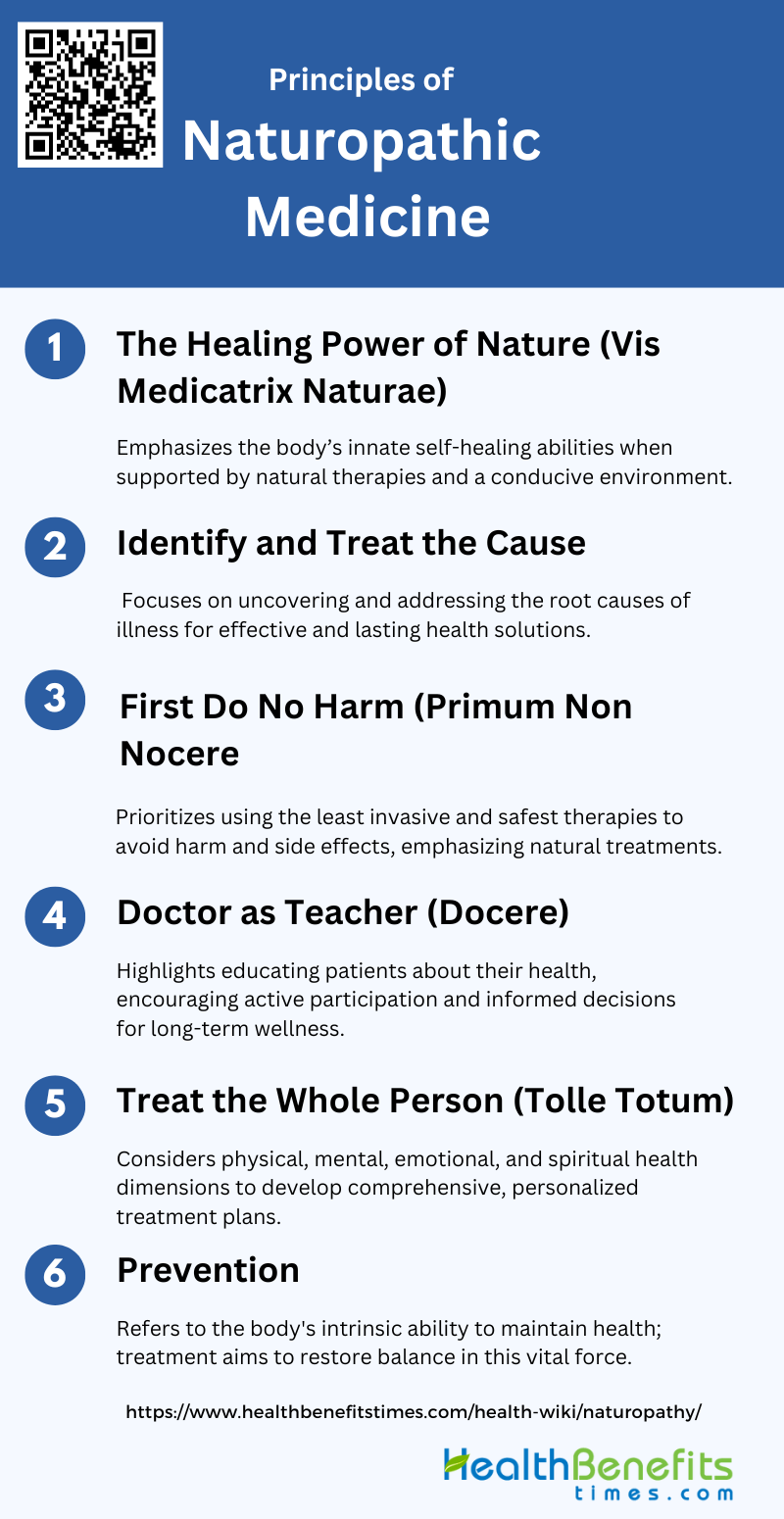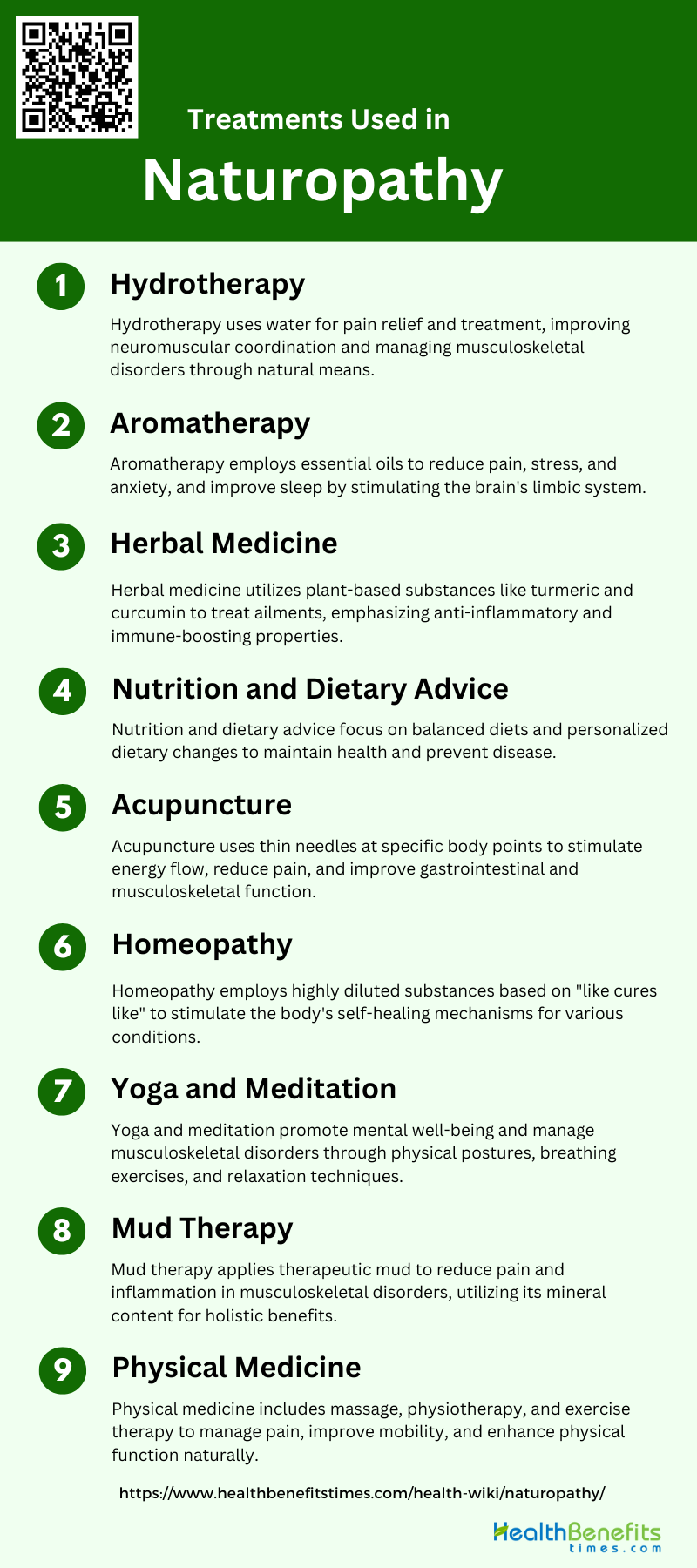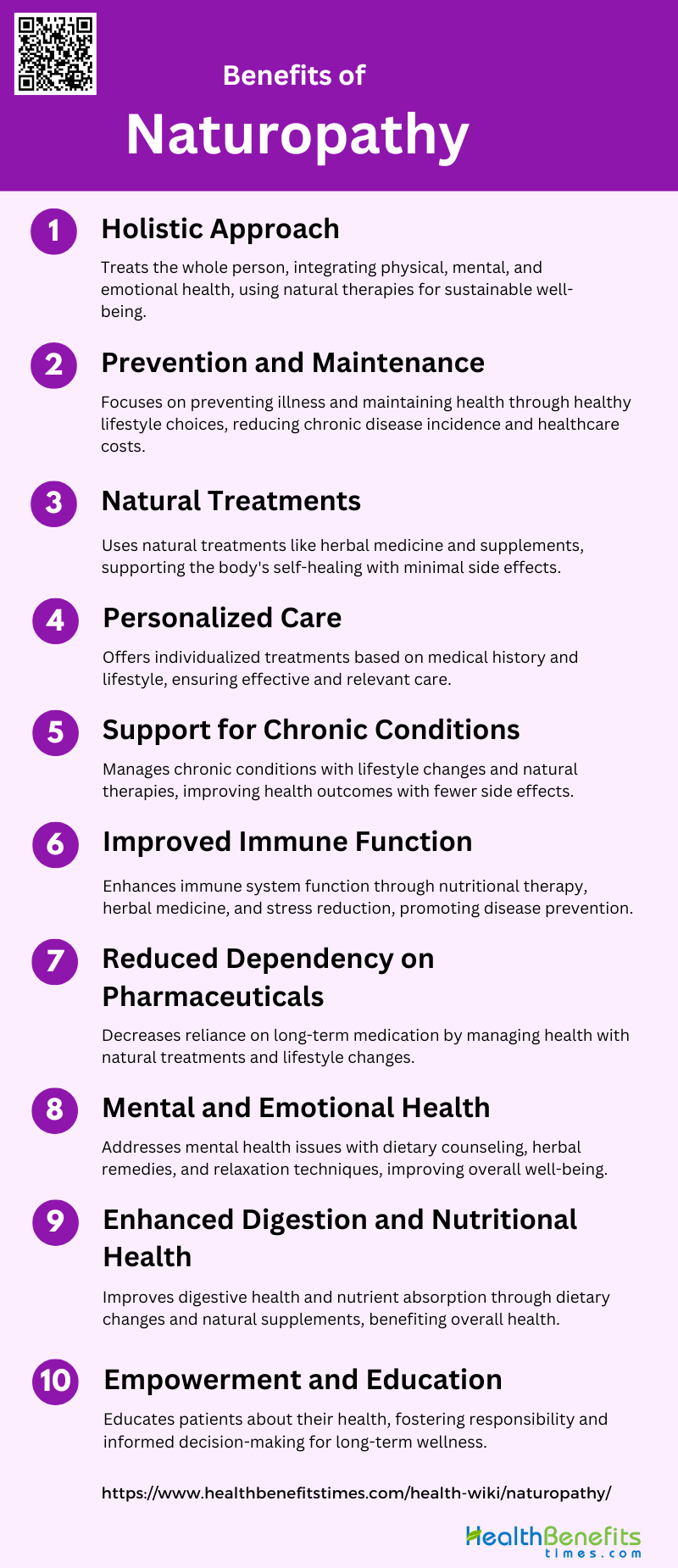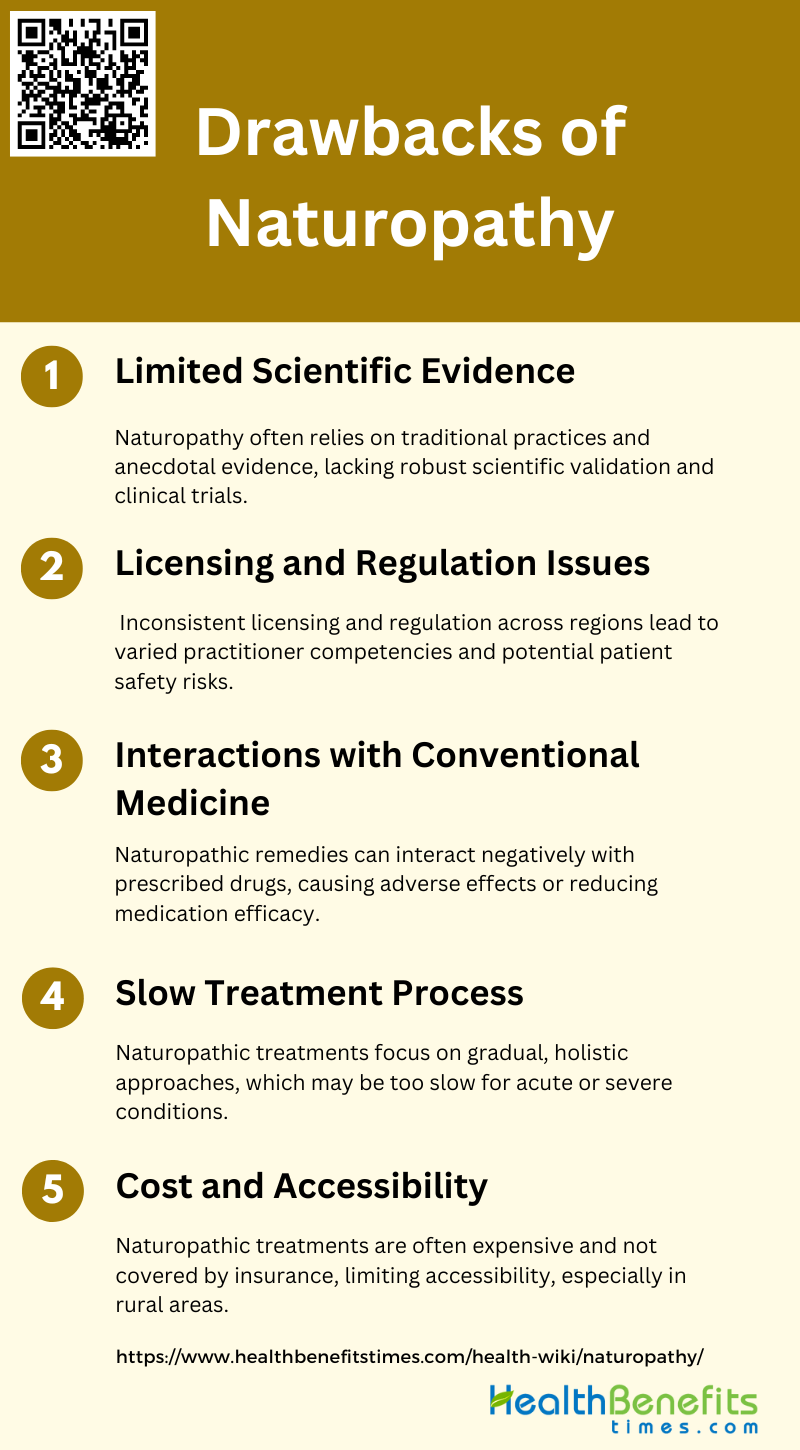Naturopathy, also known as naturopathic medicine, is a form of alternative medicine that emphasizes the body’s innate ability to heal itself through natural means. It integrates traditional healing practices with modern scientific knowledge, employing a variety of treatments such as herbal medicine, acupuncture, homeopathy, nutritional counseling, and lifestyle modifications. Naturopathic practitioners focus on holistic care, addressing the physical, mental, and spiritual aspects of health, and often spend considerable time with patients to develop personalized treatment plans. The core principles of naturopathy include the healing power of nature, identifying and treating the root cause of illness, doing no harm, treating the whole person, and emphasizing prevention and education. While naturopathy can complement conventional medicine, it remains controversial due to varying levels of scientific evidence supporting its efficacy and safety.
History of naturopathy
Originating in the 19th century with the hydrotherapy and nature cure movements in Austria and Germany, it was later professionalized in North America. In the United States, naturopathy emerged around the turn of the 20th century, experienced a decline in the late 1930s, and saw a resurgence in the 1970s due to the holistic health movement. In India, naturopathy has ancient roots, with practices mentioned in historical texts. The Indian government has supported its development through institutions like the Central Council for Research in Yoga & Naturopathy and the National Institute of Naturopathy, leading to the establishment of numerous hospitals dedicated to naturopathic care. In Ghana, the naturopathic movement began in the 1960s and has recently gained momentum with the establishment of educational standards and research initiatives. This global evolution of naturopathy highlights its adaptability and enduring appeal across different cultures and eras.
How does Naturopathy work?
It emphasizes the treatment of the whole person, considering physical, mental, and emotional aspects, rather than just addressing specific symptoms. Naturopathic practitioners use a variety of treatment modalities, including dietary changes, lifestyle and behavior modifications, herbal medicines, and nutritional supplements, to support the body’s self-healing processes. The principles of naturopathy include the healing power of nature, identifying and treating the root cause of illness, and focusing on prevention and overall well-being. By integrating these principles, naturopathy aims to enhance the body’s natural defenses and promote long-term health and vitality.
Principles of Naturopathic medicine
These principles emphasize the body’s inherent ability to heal itself, the importance of treating the root cause of illness, and the necessity of individualized care. Below are the key principles that form the foundation of naturopathic medicine:
1. The Healing Power of Nature (Vis Medicatrix Naturae)
The principle of the healing power of nature, or Vis Medicatrix Naturae, is central to naturopathic medicine. It emphasizes the body’s inherent ability to heal itself when provided with the right conditions and support. This concept is not only about the internal healing mechanisms but also extends to the benefits of the natural environment. For instance, exposure to green spaces and natural settings has been shown to improve mental health and vitality, supporting the idea that nature itself can be a powerful healer. This principle encourages naturopaths to use natural therapies and to create environments that facilitate the body’s self-healing processes.
2. Identify and Treat the Cause (Tolle Causam)
This approach, known as Tolle Causam, involves a thorough assessment of the patient’s lifestyle, environment, and genetic factors to uncover underlying issues contributing to their health problems. By addressing these root causes, naturopaths aim to provide more effective and lasting solutions for their patients. This principle is particularly important in managing chronic diseases, where understanding and modifying the contributing factors can significantly improve patient outcomes.
3. First Do No Harm (Primum Non Nocere)
The principle of “First Do No Harm” (Primum Non Nocere) is a fundamental tenet of naturopathic medicine. It emphasizes the use of the least invasive and least harmful therapies necessary to achieve health and wellness. Naturopaths prioritize treatments that minimize the risk of side effects and avoid suppressing symptoms without addressing the underlying cause. This approach often involves using natural therapies, such as dietary changes, herbal medicine, and lifestyle modifications, which are generally considered safer than conventional pharmaceutical interventions.
4. Doctor as Teacher (Docere)
The principle of “Doctor as Teacher” (Docere) highlights the importance of educating patients about their health and empowering them to take an active role in their wellness journey. Naturopathic doctors spend significant time with their patients, explaining the causes of their health issues and the rationale behind the recommended treatments. This educational approach helps patients understand how their lifestyle choices impact their health and encourages them to make informed decisions that promote long-term well-being. By fostering a collaborative relationship, naturopaths aim to inspire and motivate patients to adopt healthier habits.
5. Treat the Whole Person (Tolle Totum)
Treating the whole person, or Tolle Totum, is a holistic approach that considers the physical, mental, emotional, and spiritual aspects of health. Naturopathic medicine recognizes that these dimensions are interconnected and that imbalances in one area can affect overall well-being. This principle involves a comprehensive assessment of the patient’s life, including their diet, stress levels, relationships, and environment, to develop a personalized treatment plan that addresses all aspects of their health. By treating the whole person, naturopaths aim to restore balance and promote optimal health.
6. Prevention
Prevention is a cornerstone of naturopathic medicine, emphasizing the importance of proactive measures to maintain health and prevent disease. Naturopaths advocate for healthy lifestyle choices, such as a balanced diet, regular exercise, stress management, and adequate sleep, to reduce the risk of developing chronic conditions. They also educate patients about potential risk factors and provide guidance on how to mitigate them. By focusing on prevention, naturopathic medicine aims to reduce the incidence of illness and promote long-term health and vitality. This proactive approach aligns with modern public health strategies and underscores the value of preventive care in achieving sustainable health outcomes.
Treatments used in Naturopathy
Naturopathy employs a variety of treatments aimed at promoting the body’s natural healing processes. These treatments are holistic in nature, focusing on the physical, mental, and emotional well-being of the individual. Below are some of the most commonly used treatments in naturopathy:
1. Hydrotherapy
Hydrotherapy, a core component of naturopathy, involves the use of water for pain relief and treatment. Techniques such as underwater massage have shown significant benefits in improving neuromuscular coordination and relieving muscle soreness. The mechanism behind this involves the release of proteins from muscle tissue into the blood, enhancing neuromuscular performance capacity. Hydrotherapy is also used in the management of musculoskeletal disorders, where it helps reduce pain and improve the range of motion. This modality is rooted in the historical practices of naturopathy, which emphasize the body’s self-healing capabilities through natural means.
2. Aromatherapy
Aromatherapy, the use of essential oils for therapeutic purposes, is another popular naturopathic treatment. It has been found to reduce pain, stress, and anxiety, and improve sleep quality, particularly in postoperative care. Essential oils are believed to work by stimulating the olfactory system, which in turn affects the limbic system, the part of the brain that controls emotions. This treatment is often used in conjunction with other naturopathic practices to enhance overall well-being and promote relaxation.
3. Herbal Medicine
Herbal medicine is extensively used in naturopathy for managing various health conditions. It involves the use of plant-based substances to treat ailments and promote health. For instance, herbal treatments are commonly recommended for conditions like endometriosis, dysmenorrhea, and menorrhagia. Naturopaths often prescribe herbs such as turmeric, curcumin, and Astragalus membranaceus for their anti-inflammatory and immune-boosting properties. The use of herbal medicine is deeply rooted in traditional naturopathic practices and continues to be a significant part of contemporary naturopathy.
4. Nutrition and Dietary Advice
Nutrition and dietary advice are fundamental aspects of naturopathic treatment. Naturopaths emphasize the importance of a balanced diet in maintaining health and preventing disease. They often recommend dietary changes tailored to individual needs, such as anti-inflammatory diets, Mediterranean diets, and gluten or dairy restrictions. Both naturopaths and dietitians use holistic approaches to diagnose and treat functional bowel disorders, highlighting the significant role of diet in managing these conditions. This approach aligns with the naturopathic principle of treating the whole person rather than just the symptoms.
5. Acupuncture
Acupuncture, a traditional Chinese medicine practice, is widely used in naturopathy to treat various conditions. It involves inserting thin needles into specific points on the body to stimulate energy flow and promote healing. Acupuncture has been shown to improve gastrointestinal motility, reduce postoperative nausea and vomiting, and alleviate pain. It is also used in the management of musculoskeletal disorders, where it helps reduce pain and improve function. The integration of acupuncture into naturopathic practice reflects the holistic approach of naturopathy, which combines different therapeutic modalities to achieve optimal health.
6. Homeopathy
Homeopathy is a naturopathic treatment that uses highly diluted substances to stimulate the body’s self-healing mechanisms. It is based on the principle of “like cures like,” where substances that cause symptoms in a healthy person are used to treat similar symptoms in a sick person. Homeopathy is commonly used for conditions such as dysmenorrhea and menorrhagia. Despite the lack of strong scientific evidence supporting its efficacy, homeopathy remains a popular treatment modality among naturopaths due to its holistic and individualized approach.
7. Yoga and Meditation
Yoga and meditation are integral components of naturopathic treatment, particularly for managing musculoskeletal disorders and promoting mental well-being. Yoga combines physical postures, breathing exercises, and meditation to improve flexibility, strength, and relaxation. It has been shown to be beneficial in managing conditions like low back pain, carpal tunnel syndrome, and rheumatoid arthritis. Meditation, on the other hand, helps reduce stress, anxiety, and improve mental clarity. Together, yoga and meditation support the naturopathic principle of treating the mind, body, and spirit.
8. Mud Therapy
Mud therapy involves the application of therapeutic mud to the body to treat various health conditions. It is particularly effective in managing musculoskeletal disorders such as knee osteoarthritis, where it helps reduce pain and improve functional status. The therapeutic properties of mud are believed to come from its mineral content, which can have anti-inflammatory and analgesic effects. Mud therapy is a traditional naturopathic treatment that continues to be used for its natural and holistic benefits.
9. Physical Medicine
Physical medicine in naturopathy includes a range of treatments such as massage, physiotherapy, and exercise therapy. These treatments are used to manage pain, improve mobility, and enhance overall physical function. For example, massage therapy has been shown to be effective in treating chronic back pain, with benefits lasting for several months. Exercise therapy, including practices like yoga, is also used to improve strength, flexibility, and mental well-being. Physical medicine aligns with the naturopathic focus on promoting the body’s self-healing capabilities through natural and non-invasive methods.
Conditions Treated by Naturopathy
Naturopathy addresses a wide range of health conditions by focusing on holistic and natural treatment methods. This approach aims to treat the root cause of illnesses rather than just alleviating symptoms. Below are some of the common conditions that can be effectively managed through naturopathic treatments:
1. Digestive Disorders
Both naturopathic and dietetic approaches emphasize holistic diagnosis and treatment, with a primary focus on dietary adjustments. Naturopaths often use vitamin, mineral, and herbal supplements, and may recommend additional treatments like osteopathy and acupuncture to manage symptoms effectively. The integrative physiological approach adopted by naturopaths also highlights the relevance of the digestive system in chronic health complaints, further supporting its efficacy in treating digestive disorders.
2. Mental Health
Studies have shown significant improvements in symptoms when patients are treated by naturopathic physicians. For instance, a study conducted in a community health center demonstrated that patients experienced substantial reductions in depression and anxiety scores after receiving naturopathic care. The holistic approach, which includes lifestyle and dietary changes, herbal medicines, and nutritional supplements, contributes to these positive outcomes.
3. Cardiovascular Health
Research indicates that naturopathic treatments, which often include dietary changes, lifestyle modifications, and the use of herbal and nutritional supplements, can significantly improve cardiovascular health. These treatments are part of a whole-system, multi-modality approach that has shown efficacy in treating chronic conditions, including cardiovascular diseases. The integrative approach of naturopathy, focusing on multiple physiological systems, further supports its role in cardiovascular health management.
4. Women’s Health
A study comparing naturopathic therapy with conventional medical therapy for menopausal symptoms found that naturopathy was particularly effective in improving insomnia and decreased energy levels. Naturopathic treatments for women’s health often involve dietary and lifestyle changes, herbal medicines, and nutritional supplements, which contribute to their effectiveness.
5. Autoimmune Diseases
The integrative physiological approach of naturopathy, which considers multiple body systems, is particularly beneficial for treating complex conditions like autoimmune diseases. This approach often includes dietary changes, lifestyle modifications, and the use of herbal and nutritional supplements to manage symptoms and improve overall health. The holistic nature of naturopathy supports its effectiveness in treating autoimmune conditions.
6. Allergies
The focus on the body’s self-healing process and the integration of multiple treatment modalities contribute to the successful management of allergy symptoms. The emphasis on prevention and optimal health promotion further supports the role of naturopathy in treating allergies.
7. Respiratory Conditions
Naturopathic treatments for respiratory conditions often involve dietary and lifestyle changes, herbal medicines, and nutritional supplements. The integrative approach of naturopathy, which considers multiple physiological systems, is particularly beneficial for managing chronic respiratory conditions. Studies have shown that naturopathy can effectively address respiratory issues by focusing on the body’s self-healing process and promoting overall health.
8. Skin Conditions
Naturopathy has been effective in treating various skin conditions through a holistic approach that includes dietary changes, lifestyle modifications, and the use of herbal and nutritional supplements. The integrative physiological approach adopted by naturopaths considers the relevance of the integumentary system in chronic health complaints, supporting the efficacy of naturopathic treatments for skin conditions. The emphasis on prevention and optimal health promotion further enhances the effectiveness of naturopathy in managing skin issues.
9. Musculoskeletal Issues
Studies have shown that naturopathic treatments, which often include dietary changes, lifestyle modifications, and the use of herbal and nutritional supplements, can significantly improve musculoskeletal health. The holistic approach of naturopathy, focusing on multiple body systems, supports its effectiveness in managing musculoskeletal conditions.
10. Metabolic and Endocrine Disorders
Naturopathy has shown promise in treating metabolic and endocrine disorders, such as type 2 diabetes and polycystic ovary syndrome. The whole-system, multi-modality approach of naturopathy, which includes dietary changes, lifestyle modifications, and the use of herbal and nutritional supplements, has been effective in managing these conditions. The integrative physiological approach adopted by naturopaths further supports the role of naturopathy in treating metabolic and endocrine disorders.
Benefits of Naturopathy
This practice can lead to numerous health benefits, including improved physical and mental well-being. Here are some key benefits of naturopathy:
1. Holistic Approach
Naturopathy is renowned for its holistic approach to health, emphasizing the treatment of the whole person rather than just the symptoms of a disease. This method integrates physical, mental, and emotional aspects of health, aiming to restore balance and promote overall well-being. Naturopaths often employ a variety of natural therapies, including dietary changes, lifestyle modifications, and herbal medicines, to support the body’s innate healing processes. This comprehensive approach can lead to more sustainable health outcomes and improved quality of life for patients.
2. Prevention and Maintenance
A core principle of naturopathy is the prevention of illness and the maintenance of health. Naturopathic practitioners focus on identifying and addressing the root causes of health issues before they develop into more serious conditions. This preventive approach includes promoting healthy lifestyle choices, such as proper nutrition, regular exercise, and stress management techniques. By emphasizing prevention, naturopathy can help reduce the incidence of chronic diseases and lower healthcare costs.
3. Natural Treatments
Naturopathy relies on natural treatments to support and enhance the body’s self-healing capabilities. Common modalities include herbal medicine, nutritional supplements, hydrotherapy, and homeopathy. These treatments are often chosen for their minimal side effects and their ability to work synergistically with the body’s natural processes. For example, herbal remedies and dietary adjustments can effectively manage conditions like anxiety and cardiovascular disease without the adverse effects associated with conventional pharmaceuticals.
4. Personalized Care
This medicine is highly individualized, with treatments tailored to meet the unique needs of each patient. Practitioners take into account a person’s medical history, lifestyle, and specific health concerns to develop a customized treatment plan. This personalized approach ensures that care is relevant and effective, addressing the underlying causes of health issues rather than just alleviating symptoms. Personalized care can lead to better patient outcomes and higher satisfaction rates.
5. Support for Chronic Conditions
Naturopathy has shown promise in managing chronic conditions such as cardiovascular disease, diabetes, and mental health disorders. By focusing on lifestyle modifications, dietary changes, and natural therapies, naturopathic practitioners can help patients manage symptoms and improve their overall health. Studies have demonstrated that naturopathic care can lead to significant improvements in chronic disease outcomes, often with fewer side effects compared to conventional treatments.
6. Improved Immune Function
Techniques such as nutritional therapy, herbal medicine, and stress reduction practices can boost immune function and overall resilience. By supporting the immune system, naturopathy can help prevent illness and promote faster recovery when sickness does occur.
7. Reduced Dependency on Pharmaceuticals
One of the significant benefits of naturopathy is the potential to reduce dependency on pharmaceuticals. By using natural treatments and focusing on lifestyle changes, patients can often manage their health conditions without the need for long-term medication use. This approach can minimize the risk of side effects and drug interactions, leading to safer and more sustainable health management.
8. Mental and Emotional Health
Treatments such as dietary counseling, herbal remedies, and relaxation techniques can effectively address mental health issues like anxiety and depression. Studies have shown that naturopathic care can lead to significant improvements in mental health outcomes, enhancing overall quality of life.
9. Enhanced Digestion and Nutritional Health
Digestive health is a key focus in naturopathy, with practitioners often addressing issues such as food intolerances, gut flora imbalances, and nutrient deficiencies. By recommending dietary changes and natural supplements, naturopaths can help improve digestion and nutrient absorption. Enhanced digestive health can lead to better overall health, as the body is better able to obtain and utilize essential nutrients.
10. Empowerment and Education
Naturopathy empowers patients by educating them about their health and involving them in their treatment plans. This educational approach helps patients understand the importance of lifestyle choices and self-care practices in maintaining health. By fostering a sense of responsibility and control over their health, naturopathy encourages patients to make informed decisions and adopt healthier habits, leading to long-term wellness.
The Role of Naturopathy in Integrative Medicine
Recognized by the National Institutes of Health and the World Health Organization, naturopathy emphasizes the body’s innate healing capacity and focuses on disease prevention and health promotion. Naturopathic practitioners employ a variety of treatment modalities, including dietary changes, lifestyle modifications, herbal medicines, and nutritional supplements, to address a wide range of health conditions, particularly chronic diseases. The holistic approach of naturopathy, which includes treating the whole person and addressing the root causes of illness, aligns well with the principles of integrative medicine, making it a valuable component in the management of both physical and mental health issues. The integration of naturopathy into primary health care systems has the potential to improve health outcomes and reduce healthcare costs by emphasizing preventive care and the use of non-pharmacologic therapies. As the demand for complementary and integrative health therapies continues to grow, naturopathy’s role in providing patient-centered, holistic care is increasingly recognized and valued.
Drawbacks of Naturopathy
While naturopathy offers various benefits, it is not without its drawbacks. These limitations can affect the effectiveness and safety of treatments for some individuals. Here are some key drawbacks of naturopathy:
1. Limited Scientific Evidence
Many naturopathic treatments are based on traditional practices and anecdotal evidence rather than rigorous clinical trials. This lack of robust scientific validation can make it challenging for practitioners to gain widespread acceptance within the medical community. Additionally, the variability in treatment outcomes and the reliance on patient testimonials rather than empirical data can lead to skepticism about the reliability and effectiveness of naturopathic approaches.
2. Licensing and Regulation Issues
The licensing and regulation of naturopathy vary significantly across different regions, leading to inconsistencies in the quality and standards of care. In some areas, naturopaths may not be required to undergo formal education or certification, which can result in a wide range of competencies among practitioners. This lack of standardized regulation can pose risks to patient safety and undermine the credibility of the profession. Moreover, the absence of uniform licensing requirements can make it difficult for patients to discern qualified practitioners from those with inadequate training.
3. Interactions with Conventional Medicine
Patients often do not disclose their use of naturopathic remedies to their primary healthcare providers, which can complicate treatment plans and pose significant health risks. For instance, certain herbal supplements may interfere with the metabolism of pharmaceuticals, potentially causing harmful interactions. This lack of communication between naturopaths and conventional medical practitioners underscores the need for integrated care and better patient education.
4. Slow Treatment Process
Naturopathic treatments often emphasize gradual, holistic approaches to health, which can result in slower progress compared to conventional medical interventions. While this method aims to address the root causes of health issues and promote long-term wellness, it may not be suitable for acute or severe conditions that require immediate attention. Patients seeking quick relief may become frustrated with the slow pace of naturopathic treatments, leading to discontinuation or skepticism about their effectiveness. This slow treatment process can be a significant drawback for those in need of rapid symptom management.
5. Cost and Accessibility
The cost and accessibility of naturopathic treatments can be prohibitive for many individuals. Since these therapies are often not covered by insurance, patients must pay out-of-pocket, which can be expensive. Additionally, access to qualified naturopathic practitioners may be limited, particularly in rural or underserved areas. This financial burden and lack of availability can prevent many people from seeking or continuing naturopathic care, despite their interest in natural health solutions. The high cost and limited accessibility highlight the need for broader insurance coverage and more widespread availability of naturopathic services.







